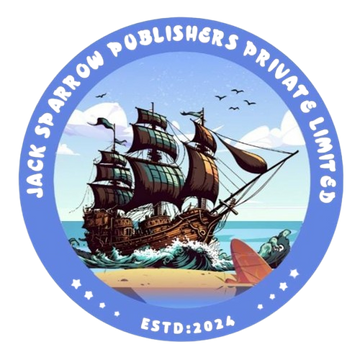Authors’ Plagiarism and Copyright Policy

Authors’ Plagiarism and Copyright Policy
Jack Sparrow Publishers is dedicated to protecting the integrity, originality, and credibility of scholarly research. The Plagiarism and Copyright Policy of Jack Sparrow Publishers safeguards originality, respects intellectual property, and promotes ethical publishing practices. By submitting a manuscript, authors acknowledge their agreement to these policies and accept full responsibility for their research integrity. To ensure high academic standards, authors must adhere to the following plagiarism and copyright guidelines when submitting manuscripts for journals, books, or conference proceedings.


(a) What Constitutes Plagiarism?
Plagiarism is defined as the unethical act of using another person’s work, ideas, or intellectual property without proper acknowledgment. This includes but is not limited to:
1. Direct Plagiarism – Copying text, phrases, or sentences verbatim from another work without quotation marks or citation.
2. Mosaic Plagiarism – Borrowing ideas, figures, or paraphrased sentences without acknowledgment.
3. Self-Plagiarism (Redundant Publication) – Reusing one’s own previously published material (text, figures, or data) in a new submission without disclosure.
4. Image/Data Plagiarism – Manipulating or reusing previously published figures, tables, or datasets without permission or attribution.
5. Unattributed Paraphrasing – Rewording someone else’s work without proper citation.
(b) Similarity Check Procedure
Every manuscript is screened using advanced plagiarism detection software (Turnitin/iThenticate).
Acceptable similarity score: ≤ 10–15% (excluding references, methodology, and standard phrases).
Higher similarity results in one of the following outcomes:
Minor Overlap (15–25%) → Manuscript returned for corrections.
Major Overlap (>25%) → Manuscript rejected outright.
Authors may be asked to submit a plagiarism check certificate if required.
(c) Consequences of Plagiarism
First Instance: Authors are asked to revise and properly cite sources.
Severe Cases: Manuscript is rejected or retracted if already published.
Repeated Offenses: Authors may be blacklisted from submitting to Jack Sparrow Publishers and reported to their institution/funding body.
(a) Ownership of Copyright
Authors retain copyright of their published work unless otherwise stated.
By submitting, authors grant Jack Sparrow Publishers the non-exclusive right to publish, archive, and distribute their work worldwide.
(b) License of Publication
Published works are generally made available under Creative Commons licenses (e.g., CC BY, CC BY-NC).
This ensures global access while protecting author rights and enabling lawful reuse with proper attribution.
(c) Author Responsibilities
Authors must guarantee that:
The manuscript is original and not under review elsewhere.
They have obtained permissions for any copyrighted material (images, figures, tables, datasets, software).
All co-authors consent to submission and agree on the final version.
Authors are responsible for ensuring the work does not infringe copyright or intellectual property rights of third parties.
(d) Publisher’s Rights
Jack Sparrow Publishers reserves the right to retract or remove any published work found to breach copyright or plagiarism policies.
A permanent record of retractions, corrections, or updates will be maintained following COPE guidelines.


Reuse of content (e.g., images, charts, excerpts) from other works requires clear attribution and, when necessary, written permission from the copyright holder.
Content used under fair use or Creative Commons licensing must still include
acknowledgment of the original source.


Jack Sparrow Publishers supports green open access. Authors are allowed to:
Deposit the pre-print version (submitted manuscript) in repositories or personal websites.
Deposit the post-print version (accepted manuscript after peer review) in institutional or funding agency repositories.
Share the publisher’s final version (PDF) according to the terms of the applied Creative Commons license.


If plagiarism or copyright infringement is detected at any stage (pre-review, review, or post-publication):
The editorial office will notify the corresponding author.
Authors may be asked to provide clarification or revise the work.
Serious violations will result in:
Immediate rejection or retraction of the paper.
Notification to affiliated institutions, research bodies, and funding agencies.
Permanent ban from future publications in Jack Sparrow Publishers (in extreme cases).


Protects authors from legal disputes and ethical misconduct.
Enhances the credibility and visibility of research.
Ensures compliance with international publishing standards.
Strengthens the global reputation of Jack Sparrow Publishers.


(a) What Constitutes Plagiarism?
Plagiarism is defined as the unethical act of using another person’s work, ideas, or intellectual property without proper acknowledgment. This includes but is not limited to:
1. Direct Plagiarism – Copying text, phrases, or sentences verbatim from another work without quotation marks or citation.
2. Mosaic Plagiarism – Borrowing ideas, figures, or paraphrased sentences without acknowledgment.
3. Self-Plagiarism (Redundant Publication) – Reusing one’s own previously published material (text, figures, or data) in a new submission without disclosure.
4. Image/Data Plagiarism – Manipulating or reusing previously published figures, tables, or datasets without permission or attribution.
5. Unattributed Paraphrasing – Rewording someone else’s work without proper citation.
(b) Similarity Check Procedure
Every manuscript is screened using advanced plagiarism detection software (Turnitin/iThenticate).
Acceptable similarity score: ≤ 10–15% (excluding references, methodology, and standard phrases).
Higher similarity results in one of the following outcomes:
Minor Overlap (15–25%) → Manuscript returned for corrections.
Major Overlap (>25%) → Manuscript rejected outright.
Authors may be asked to submit a plagiarism check certificate if required.
(c) Consequences of Plagiarism
First Instance: Authors are asked to revise and properly cite sources.
Severe Cases: Manuscript is rejected or retracted if already published.
Repeated Offenses: Authors may be blacklisted from submitting to Jack Sparrow Publishers and reported to their institution/funding body.
(a) Ownership of Copyright
Authors retain copyright of their published work unless otherwise stated.
By submitting, authors grant Jack Sparrow Publishers the non-exclusive right to publish, archive, and distribute their work worldwide.
(b) License of Publication
Published works are generally made available under Creative Commons licenses (e.g., CC BY, CC BY-NC).
This ensures global access while protecting author rights and enabling lawful reuse with proper attribution.
(c) Author Responsibilities
Authors must guarantee that:
The manuscript is original and not under review elsewhere.
They have obtained permissions for any copyrighted material (images, figures, tables, datasets, software).
All co-authors consent to submission and agree on the final version.
Authors are responsible for ensuring the work does not infringe copyright or intellectual property rights of third parties.
(d) Publisher’s Rights
Jack Sparrow Publishers reserves the right to retract or remove any published work found to breach copyright or plagiarism policies.
A permanent record of retractions, corrections, or updates will be maintained following COPE guidelines.


Reuse of content (e.g., images, charts, excerpts) from other works requires clear attribution and, when necessary, written permission from the copyright holder.
Content used under fair use or Creative Commons licensing must still include
acknowledgment of the original source.


Jack Sparrow Publishers supports green open access. Authors are allowed to:
Deposit the pre-print version (submitted manuscript) in repositories or personal websites.
Deposit the post-print version (accepted manuscript after peer review) in institutional or funding agency repositories.
Share the publisher’s final version (PDF) according to the terms of the applied Creative Commons license.


If plagiarism or copyright infringement is detected at any stage (pre-review, review, or post-publication):
The editorial office will notify the corresponding author.
Authors may be asked to provide clarification or revise the work.
Serious violations will result in:
Immediate rejection or retraction of the paper.
Notification to affiliated institutions, research bodies, and funding agencies.
Permanent ban from future publications in Jack Sparrow Publishers (in extreme cases).


Protects authors from legal disputes and ethical misconduct.
Enhances the credibility and visibility of research.
Ensures compliance with international publishing standards.
Strengthens the global reputation of Jack Sparrow Publishers.

